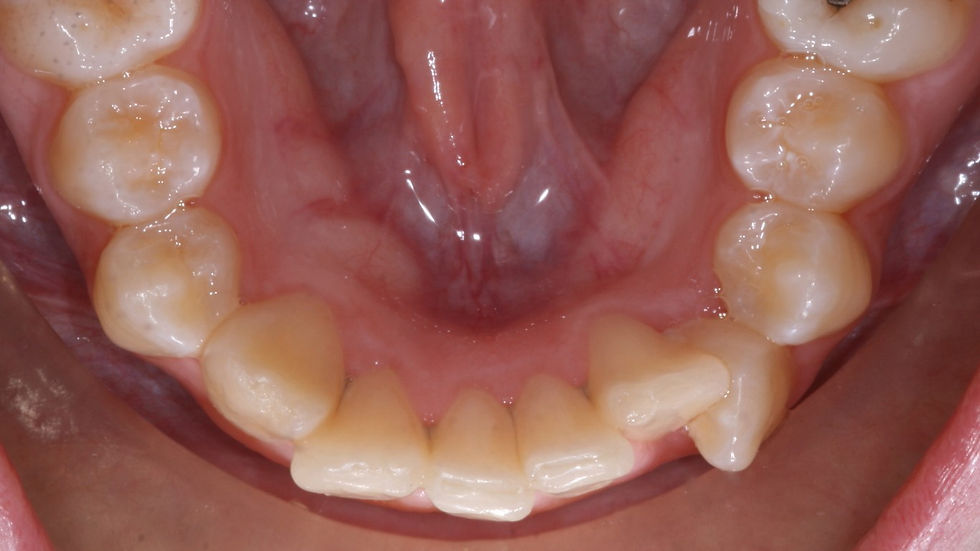Why Are My Teeth Shifting and What Can I Do to Prevent It?
- RDH
- 19 mars 2021
- 3 min de lecture
It is a misconception to think of your teeth as totally immovable. In fact, there is some flexibility and movement over time, due to how teeth are fixed to your mouth. Your teeth are connected to your upper and lower jawbones by periodontal ligaments and cementum (a thin layer of bonelike material covering the roots of the teeth). This combination allows your mouth to withstand the forces placed on your teeth by chewing and other regular activities.

Your teeth shift naturally throughout your life and as the result of other stressors and triggers. Orthodontic treatment often uses this natural capacity for change by deliberately altering your teeth and bite position.
Causes of teeth shifting may include:
· The aging process.
· Orthodontic treatment such as braces.
· Adjustment after orthodontic treatment.
· Injury or impact to your face or mouth.
· Bruxism (grinding your teeth).
· Clenching your jaw and teeth together.
· Tooth decay, gum disease, and other dental conditions.
· Spaces caused by missing teeth.
As you can see from the potential causes above, some factors that cause teeth to shift are not always under your control. It is essential to address teeth shifting with your dentist as it can lead to other, more severe problems with your teeth, bite, and overall dental health. There are measures you can take to deal with your shifting teeth. First let us focus on prevention.
Due to the forces put on your mouth through daily activity and changes to your body through the natural aging process, there is a normal amount of teeth shifting that cannot be prevented. Luckily, that is completely fine, as we at Clinique Dentaire WM Dorval are prepared to assist you with any symptoms you may experience during these changes.
When it comes to preventing teeth shifting, being proactive is your best bet, which goes for most dental issues. You can lower your risk of developing severe enough teeth shifting to require treatment by simply practicing a proper oral hygiene routine. Good oral hygiene helps to avoid a wide range of other dental problems you can encounter during your lifetime.
Steps for good oral care include the following:
· Brushing your teeth twice a day, gently and with a soft-bristled toothbrush for two minutes.
· Cleaning between your teeth with floss or an interdental brush.
· Rinsing with mouthwash or water after meals.
· Consuming a healthy diet low in sugary foods and drinks.
· Avoid smoking and chewing tobacco.
· Visiting us at Clinique Dentaire WM Dorval at least twice a year and following our recommendations and instruction.

There is no magic fix-all for teeth shifting, as the appropriate treatment depends on its severity and the underlying cause. Some teeth shifting will require little to no treatment and produce no symptoms, while more extreme cases will require orthodontic intervention or dental procedures.
It is a good idea to check in with us at Clinique Dentaire WM Dorval for our treatment recommendations because the sooner you manage shifting teeth, the more likely you are to prevent associated problems that require additional treatment. This is especially true if you find yourself thinking, “my teeth are shifting, and they hurt.”
Treatments for teeth shifting may include:
· Orthodontic treatments, like Invisalign, braces or a retainer.
· Dental restorations, like fillings and crowns.
· Implants to replace missing teeth.
· Night guards to help with grinding and clenching.
· Treatment to address the underlying cause such as gum disease or decay.
Teeth shifting can be a discouraging problem, especially if you take pride in your smile. The good news is that there are many options available to help correct the issue. Remember, your teeth shifting is a natural consequence of aging and regular activity like chewing. It is encouraged to check in with us at Clinique Dentaire Wm Dorval to see if your teeth or bite need any treatment.
Sources: https://www.colgate.com/

Comments